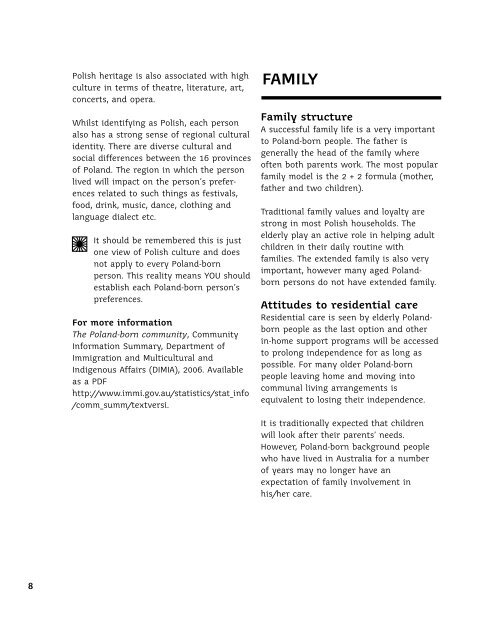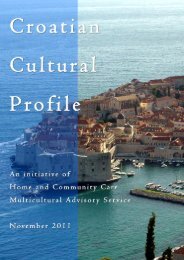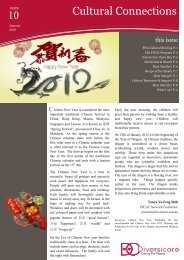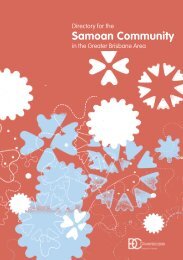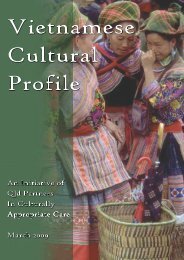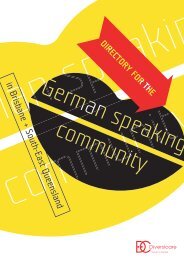Polish Culture profile - Diversicare
Polish Culture profile - Diversicare
Polish Culture profile - Diversicare
You also want an ePaper? Increase the reach of your titles
YUMPU automatically turns print PDFs into web optimized ePapers that Google loves.
8<br />
<strong>Polish</strong> heritage is also associated with high<br />
culture in terms of theatre, literature, art,<br />
concerts, and opera.<br />
Whilst identifying as <strong>Polish</strong>, each person<br />
also has a strong sense of regional cultural<br />
identity. There are diverse cultural and<br />
social differences between the 16 provinces<br />
of Poland. The region in which the person<br />
lived will impact on the person’s preferences<br />
related to such things as festivals,<br />
food, drink, music, dance, clothing and<br />
language dialect etc.<br />
It should be remembered this is just<br />
one view of <strong>Polish</strong> culture and does<br />
not apply to every Poland-born<br />
person. This reality means YOU should<br />
establish each Poland-born person’s<br />
preferences.<br />
For more information<br />
The Poland-born community, Community<br />
Information Summary, Department of<br />
Immigration and Multicultural and<br />
Indigenous Affairs (DIMIA), 2006. Available<br />
as a PDF<br />
http://www.immi.gov.au/statistics/stat_info<br />
/comm_summ/textversi.<br />
FAMILY<br />
Family structure<br />
A successful family life is a very important<br />
to Poland-born people. The father is<br />
generally the head of the family where<br />
often both parents work. The most popular<br />
family model is the 2 + 2 formula (mother,<br />
father and two children).<br />
Traditional family values and loyalty are<br />
strong in most <strong>Polish</strong> households. The<br />
elderly play an active role in helping adult<br />
children in their daily routine with<br />
families. The extended family is also very<br />
important, however many aged Polandborn<br />
persons do not have extended family.<br />
Attitudes to residential care<br />
Residential care is seen by elderly Poland-<br />
born people as the last option and other<br />
in-home support programs will be accessed<br />
to prolong independence for as long as<br />
possible. For many older Poland-born<br />
people leaving home and moving into<br />
communal living arrangements is<br />
equivalent to losing their independence.<br />
It is traditionally expected that children<br />
will look after their parents’ needs.<br />
However, Poland-born background people<br />
who have lived in Australia for a number<br />
of years may no longer have an<br />
expectation of family involvement in<br />
his/her care.


